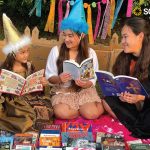Shortly before the pandemic, my missionary family was in the States visiting our supporting churches. One Sunday we were driving home from church and my 12-year-old son said, “Are all American kids like that?” There was nothing particularly wrong with the kids and teens at that church, but I had noticed how different they were from my children. My TCKs (third-culture kids) felt very out of place in a culture that was so different from the cultures in which they have been raised.
Earlier in my homeschooling journey I might have been concerned that they didn’t fit in. Now I understand that my job as their mother and teacher is not to make sure that they fit in, but that they love God, love others, know who they are in Christ, and have a well-rounded education.
Their homeschool education should train them to be well-equipped to use their skills, abilities, and knowledge for God’s glory.
Homeschooling TCKs can be a unique challenge, but with a bit of extra thought and planning–and a great deal of prayer–it is absolutely doable!
Here are eight tips I have gleaned from other experienced TCK homeschoolers as well as my own 14 years of living abroad and homeschooling three TCKs.
1. Learn the Local Language, Culture, and History
It is important that your TCKs have the opportunity to learn the language, culture, and history not only of their passport country* but of their host country**.
- Learn from the nationals! The best case scenario would be where your kids are able to learn the language and culture organically from interacting with national friends. Even if this is not possible in your situation, you can usually find a local willing to tutor your children.
- Rosetta Stone language learning software is available in many languages.
- Sonlight’s study of countries in the Eastern Hemisphere is an excellent resource.
*Passport country: the country where you hold citizenship, but not necessarily where you live
**Host country: a country where you are not a citizen but where you live as a guest or foreign worker
2. Encourage Electives in the Community
Are there local sports that your TCK could be involved in for P.E.? Could they take a class in First Aid or learn an indigenous instrument from a national? Your high school TCK may even be able to do an apprenticeship with a tailor, welder, or repair person. Be creative!
3. Celebrate and Study Your Passport Country
Many TCKs have a hard time connecting to their passport country because they have spent so little time there. Make it a point to intentionally study the history of your passport country in your homeschool. Sonlight American History is an excellent resource for American TCKs.
Also help your TCKs learn about and celebrate the holidays of your passport country. My family lives in Cambodia, and our team of missionaries gets together each November for a traditional Thanksgiving dinner and each July 4th for a cookout and games. These get-togethers allow our kids to celebrate these holidays that are unique to the United States with other Americans.
We also read books about the first Thanksgiving, Martin Luther King Jr., etc. Sonlight also has fantastic, Biblically based unit studies for Christmas/Advent and Easter. Understanding and celebrating American holidays even when abroad will help your TCKs feel better connected when they eventually return to their passport country.
4. Get Family and Friends Involved
Having extended family get involved in homeschooling can help your TCKs not feel quite so far away from those they love and miss. Some ideas for this include
- Have a grandparent read read-alouds over a video call.
- Have a family member teach writing or another class that can be taught online.
- Call cousins so they can share with each other what they learned that week.
- Take videos of your TCK reciting poetry, Scripture, or giving oral presentations, and share them with family.
5. Plan Ahead
Since international families rarely have access to libraries or other resources in English, it's necessary to to plan your curriculum a few years in advance. A big reason why I chose Sonlight is so we would have a growing library of living books in English. That choice has served us incredibly well over the years.
6. Keep Continuity
For many TCKs, life is defined by change. While most TCKs learn to handle that with grace, it is still a challenge. We as their parents can help provide some stability by keeping continuity in homeschooling. What might that look like?
Stick with One Curriculum
My children know that wherever they are and whatever transitions they may be going through, school will stay the same. That continuity brings a sense of peace, especially for those TCKs who have a harder time with change.
Homeschool Year-round
This looks different for almost every family, but I have found that it brings a great deal of stability to families that go this route.
7. Help TCKs Develop in All Areas
It can be easy to think that if your TCKs are doing well academically, they are also doing well in other areas, but that is not necessarily true. Luke 2:52 points out that young Jesus “increased in wisdom and in stature and in favor with God and man.” Like Jesus, your TCKs need to grow not only academically, but emotionally, physically, spiritually, and socially.
It can be a challenge for non-TCK parents to know how to help TCKs in these areas, but the books listed below are some great resources for learning to understand and better guide your TCKs in these areas.
Links to these books on Amazon are affiliate links.
- Misunderstood: The impact of growing up overseas in the 21st century
- Between Worlds
- Looming Transitions: Starting and Finishing Well in Cross-Cultural Service
- When Children Grieve: For Adults to Help Children Deal with Death, Divorce, Pet Loss, Moving, and Other Losses
- Hidden in My Heart: A TCK's Journey Through Cultural Transition
- Hiding in the Hallway: Anchoring Yourself as an MK
There are also several novels and biographies that can be beneficial for TCKs listed in this article.
8. Be Deliberate about Socialization
TCKs live life between cultures and naturally gravitate toward others in the same situation. They can be a great help and encouragement to one another. Even if you live hours apart, make it a priority to get together every few months with other TCKs at these kinds of events:
- Co-op events
- Music or speech recitals
- Science fairs or labs
- Birthday and holiday parties
- Field trips to local historical sites
And of course, making friends in your passport country is important as well. By the time my family left the States a few months ago, my son had made connections with other American kids and learned that a lot of American 12-year-olds do enjoy soccer and LEGO bricks like he does, and not all of them are girl-crazy! As my family follows the above tips in our homeschooling journey, my prayer is that both my son and his sisters will continue to grow in their understanding and appreciation of both America and the country in which we serve, and that they will be well-equipped to use their unique skills, abilities, and knowledge for God’s glory.
Connect with other likeminded homeschoolers wherever you are! Get the Sonlight app.









